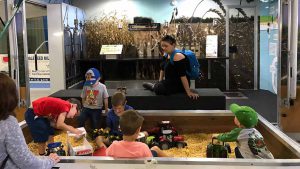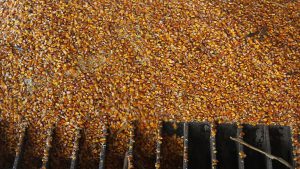We listen, and we act
FROM THE CEO'S DESK

I’M SURE EVERYONE has had one of those restless nights where you lie awake at 3 a.m. worrying about how you are going to get through the day or week; worrying about loan payments, the weather, and even just taking care of your family. Some nights, when times are really tough, you might wonder why you’re even in the farming business. I’ve certainly had those nights.
This fall, many of our farmer-members were under tremendous stress as they dealt with high levels of DON in their corn crop. The weather delayed harvest, there were limited markets for the infected corn, and, for many, storing the crop wasn’t an option.
I took a number of calls from farmer-members who were frustrated and angry with inconsistent test results, high discounts, and the outright rejection of their loads of corn. Some of them suggested that I likely didn’t understand the dire straits they are in or the enormity of the problem.
The thing is, I do understand. I recognize there are bills to pay and contracts to honour. I might have a job at Grain Farmers of Ontario, but I am also a farmer. Two years ago, I watched as our fields were wiped out by hail. This year, we didn’t move the combine in September; we had three snowfalls before we could harvest a lot of our wheat and most of our canola. Not knowing if things will work out is extremely stressful.
I’m not the only one within our organization who is involved in a farm. We have staff members who operate their own farms or continue to help with their family farms. Others live in rural areas and have connections with farmers as their neighbors and friends. The staff is committed and cares about making a difference. When we hear about the challenges you have, sometimes we can have an effect and do something immediately to resolve the problem, while other times when you call, we have to honestly say there is nothing we can do to help you. Believe it when I say; we don’t like to give that response.
When the DON crisis hit, staff committed extra hours to do their part. This meant projects were re-prioritized and other staff not directly involved in the issue picked up the slack to ensure no balls were dropped. We worked to develop innovative solutions that would mitigate potential losses.
We’ve been in regular contact with Ernie Hardeman, Minister of Agriculture, Food and Rural Affairs. This fall, he held a meeting with the entire grain industry where he asked everyone to come to the table with ideas on how to handle the crisis. We were one of only two groups to do so. We proposed ideas to help alleviate farmer-member concerns around testing protocols, cash flow, storage of corn and harvest bottlenecks, new markets for high DON corn, and support for on-farm testing and technology.
We didn’t just talk about these ideas, we acted.
We invested in grain baggers as a temporary storage solution for high DON corn to alleviate bottlenecks that developed during the late harvest. We worked with ethanol producers to assess the feasibility of their plants temporarily utilizing high DON corn, and sought out other alternative markets for the crop. We coordinated research that is evaluating the differences in testing methods used by different elevators. We worked with government to make changes to current assistance programs so that they could be better utilized by farmer-members in need of financial support. We conducted a survey of our farmer-members to determine the areas most affected by high DON levels and better understand the levels being recorded. We also provided resources to our farmer-members to help them cope with stress and other issues of mental health.
Am I suggesting that the above is enough to fill in the shortfall of income that farmers have experienced? That is not what I am saying at all. What I am saying is, given our mandate and capacities; we are doing anything within our means to address the issues facing farmer-members.
This issue will be with us for a while and there are immediate hardships and longer-range implications of the 2018 crop. We will continue to advocate your voice — our priority has been to make sure government understands that this is a major issue, secure additional funding for income support, and find ways to help get corn to a viable market.
Grain Farmers of Ontario has been working for several years on safety nets to find ways to improve the risk management programs that cover income support because we knew that this day would come. A time like this shows how dysfunctional the programs have become. Rest assured we will be pressing forward with a means of addressing the hurt.
We will have lots to hear about during the January District Meetings and I hope to see you there. •





















